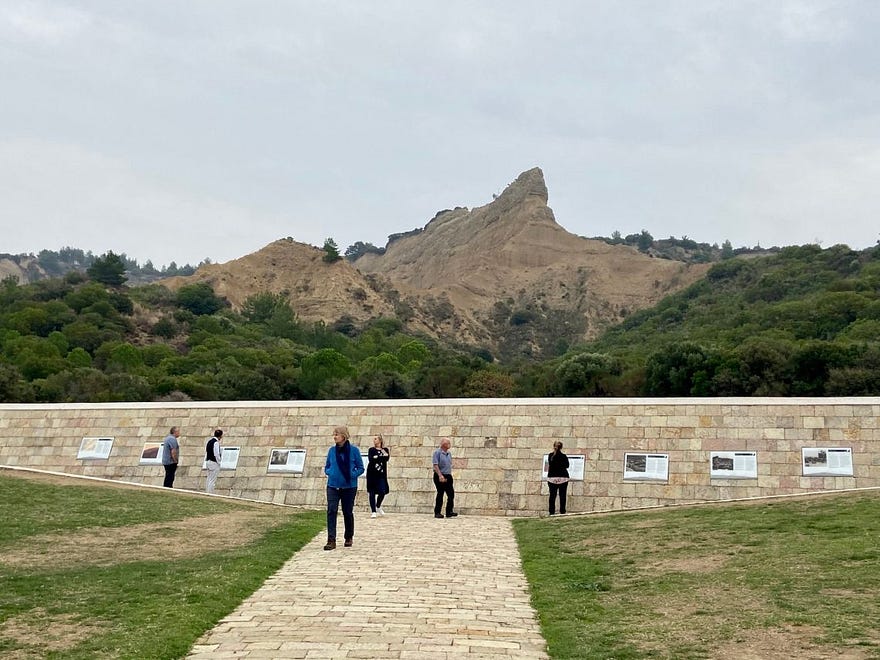After covering Istanbul in a day, we left early the next morning for Gallipoli battlefields. We had the whole bus to ourselves. With just 21 of us in the group, we had plenty of room to spread. The best part was that the bus had Wifi, which meant I could write and publish on my blog during the ride from one destination to other.
On the way, we stopped at Eceabat to have lunch. Eceabat is a small town in Çanakkale Province in the Marmara region. There was a bit of time for the lunch to be served, so we decided to take a walk. Right next to the restaurant, a big part of the seashore was converted into a memorial. It prepared us for what we were going to see.



We checked in a hotel near Canakkale and, after a brief rest, headed for the Kabatepe Museum.
I must mention here that both my husband and I were not too keen to visit the battlefields. Unlike the rest of the Australians in the group, we didn’t have any connection with WWII. We would have rather spent an extra day in Istanbul.
We walked towards the newly built complex of Kabatepe Museum half-heartedly. As we walked the gallery after gallery, looking at the weapons, ammunition, uniforms, photographs, letters written by the soldiers to their loved ones, and watching the movies, something started emerging for us.
For the first time, we learned the other side of the story. For years we have been hearing the stories of tens of thousands of Anzac dying at Gallipoli in a single day. We live in Canberra, and we have a War Memorial in our city we proudly take all visitors to see. It tells the story of the Australian who died thousands of miles away from home.
But thousands of Turks died too. And they were defending their country. Their soil. Their fields. For the first time, we heard the stories of their heroism, their sacrifice, their bravery, and their humanity as well.
Anzac Cove
From the Museum, we drove to the Anzac Cove. Anzac Cove is where the Allied Forces landed and realized their mistake. They had landed at the wrong spot. There was not enough ground to dig trenches. Instead, it was a tiny area immediately guarded by a hill where the Turkish soldier was waiting for them.
As we got off the bus, a deadly silence greeted us. For some reason, none of us made a sound. We walked softly, talked quietly, and just took in the ambiance of the place. Needless to say, we were moved beyond words.

The whole area is covered with cemeteries. We went to Ari Burnu Cemetery, Beach Cemetery, Shrapnel Valley, and Plugge’s Plateau.
At some places, the Turkish and ANZAC trenches were just eight to ten meters apart, and during the ceasefire, the soldiers would exchange cigarettes, chocolates, and beef.
It is not widely known that Turkey suffered much heavier casualties than the ANZACs.
The Gallipoli soil is littered with the graves of soldiers from both sides. So much so that the Turkish Government has declared the area a national park and forbidden any digging even for building roads in case they disturb a resting soldier.




I was surprised at how much the visit to Gallipoli had affected me. Perhaps it was the visit to the museum beforehand that made the visit very poignant.
The most heartwarming thing we saw in all that dread of death was the Turkish president Ataturk’s letter to ANZAC mothers, which is displayed amidst the graveyards to remind everyone how futile the war is.

But More Heart Wrenching Was Still To Follow
Heavy-hearted, we departed Gallipoli to Çanakkale. On route, we sat on a ferry to cross a small stretch of sea in between.
We were sitting on the ferry having coffee when a young boy interrupted us with a silly smile on his face.
“Are you from India?” He asked in Hindi. He was perhaps not even in his twenties. I wouldn’t say I liked his way of trying to make acquaintance with us. I thought he was overly friendly.
“Yes.” It was a futile question as we looked like Indians and are from India. I didn’t elaborate that though we were Indians, we lived in Australia for more than three decades.
“How is India?” A stupid question.
“Fine.” I gave the obvious answer in a flat tone. It was meant to end the conversation. But, unfortunately, I was still sullen and not in a mood for small talk.
But I felt bad at my own rudeness and asked him, “Where are you from?”
“Burma.”
“Oh really, we have been to Burma. From where in Burma are you from?”
“Arakan.”
“Oh! Did you come here to work?”
“Yes, I work in the cafe here.”
“And where is your family?”
“I have no family. They killed them all. My parents, my brothers, my cousins. I am alone in the world.”
It was as if he punched me in the heart. Here he was, a causality of war right in front of us, and I was being upset with him to interrupt me from my somber mood over the deaths a century ago.
All wars that cause innocent people’s death are futile, whether they are civilians or soldiers. The Rahinga boy was made an orphan for a futile reason too.
We can only hope that one-day humanity learns its lesson and start living in harmony. If it can do that, there are enough resources for everyone.





